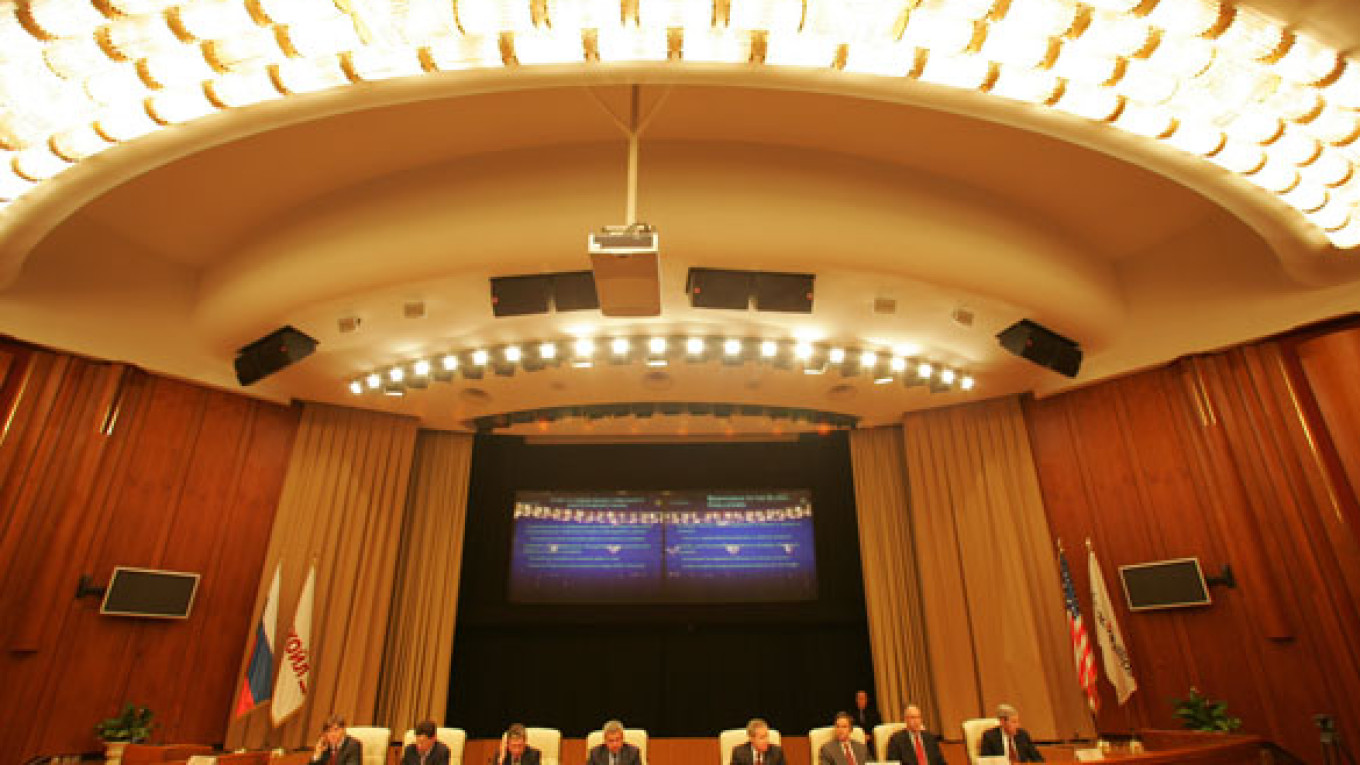ConocoPhillips said Wednesday that it would unload its full 20 percent stake in LUKoil by 2011, ending a nearly six-year strategic partnership with Russia's second-largest company.
The U.S. oil major had said in October that it planned to sell $10 billion in assets over two years to reduce debt. Chairman and CEO Jim Mulva said in December that the interest in LUKoil was a "strategic asset" and not up for sale.
In March, however, Conoco said it would reduce its holding to 10 percent.
LUKoil has agreed to buy back 7.6 percent of its shares for $3.44 billion in the third quarter, Conoco said. The remaining shares will be sold on the open market or back to LUKoil by the end of next year.
The announcement sent LUKoil’s Moscow-traded shares up 3.4 percent Wednesday, compared with a 1 percent decline for the MICEX Oil & Gas Index as crude prices slid. The news also buoyed Conoco’s shares, which were trading up 0.4 percent at noon in New York.
"Given the expected business environment and our stated strategy to enhance returns and increase distributions, we have made the decision to sell our entire stake in LUKoil. We expect to accomplish this by the end of 2011, with the proceeds used primarily to repurchase ConocoPhillips shares," Mulva said in the statement.
LUKoil said in a separate statement that it would purchase the shares by Aug. 16, with an option to purchase an additional 11.6 percent by Sept. 26.
Alexei Kokin, an oil and gas analyst at Metropol, said Conoco began selling LUKoil shares in March, reducing its stake to 19.2 percent.
"This decrease in the shares sold on the market is positive for LUKoil. Especially now, when after months of waiting and suspense, LUKoil firmly decided to buy its shares back and for a good price," Kokin said.
LUKoil said it had not yet decided whether it would exercise the option.
"We do not give any appraisals of this situation: bad or good. We're prepared to buy back 7.6 percent, as for the rest, we will have to see, come September," spokesman Dmitry Dolgov told The Moscow Times.
LUKoil CEO Vagit Alekperov and his deputy, Leonid Fedun, have been gradually building their stakes in recent years. Alekperov owns 20.599 percent, up from 13.4 percent in 2006, while Fedun owns 9.247 percent, LUKoil said in December.
Conoco has had a presence in Russia since the 1990s and first invested in LUKoil in 2004, paying nearly $2 billion for the state's final stake of 7.59 percent. It said shortly after the purchase that it would raise its stake to 10 percent and eventually boosted it to 20 percent in 2006.
"Our experience with LUKoil and the Russian authorities has been positive, and we look forward to a productive relationship in the future," Mulva said in the statement.
Kokin, of Metropol, said the move made sense for Conoco, which has been struggling to cut its debt after posting a record loss of $31.8 billion in 2008.
"It's good for Conoco, too, although it should have sold it back in 2008 but it simply could not," he said.
Hopes were high that Russia would come as a bailout ticket and future safety net. But as Russia continued to give its best reserves to state-owned companies — and LUKoil continued to pay skimpy dividends — the investment failed to live up to Americans' expectations.
"LUKoil is paying very modest dividends, around 3 percent. This is unsatisfactory for a foreign company. Compare this with the dividends paid to BP by TNK-BP, where the relationship is similar, and you'll see the picture," Kokin said.
TNK-BP paid the equivalent of 101 percent of 2009 net income in dividends, the highest ever by a Russian oil or gas company, giving a yield of 19 percent on preferred shares and 16 percent on ordinary shares, VTB Capital said in a research note in May.
ConocoPhillips announced the sale as it released its second-quarter earnings, becoming the first U.S. oil major to do so.
Net income rose to $4.16 billion, or $2.77 per share, from $859 million, or 57 cents a share a year earlier, ConocoPhillips said in its earnings report, citing an improving economy and higher commodity prices.
The company has also been trying to avoid unnecessary spending and cut down on some of its potential projects: canceling an upgrade of the German Wilhelmshaven refinery and pulling out of refining project in Saudi Arabia and an Abu Dhabi natural-gas venture.
A Message from The Moscow Times:
Dear readers,
We are facing unprecedented challenges. Russia's Prosecutor General's Office has designated The Moscow Times as an "undesirable" organization, criminalizing our work and putting our staff at risk of prosecution. This follows our earlier unjust labeling as a "foreign agent."
These actions are direct attempts to silence independent journalism in Russia. The authorities claim our work "discredits the decisions of the Russian leadership." We see things differently: we strive to provide accurate, unbiased reporting on Russia.
We, the journalists of The Moscow Times, refuse to be silenced. But to continue our work, we need your help.
Your support, no matter how small, makes a world of difference. If you can, please support us monthly starting from just $2. It's quick to set up, and every contribution makes a significant impact.
By supporting The Moscow Times, you're defending open, independent journalism in the face of repression. Thank you for standing with us.
Remind me later.


